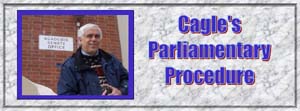
Link to Cagle's Questions page and index.
Link to Cagle's Parliamentary Procedure page.
Technically, it would be Dr. Cagle, but John would be fine.
I have a question re Robert's Rules of Order that has arisen from a local Planning and Zoning meeting. The P&Z;Commissioners' meetings are to be held according to Robert's Rules. Recently a vote was taken on which I have a question of procedure. The motion before the floor was to approve a "Special Use Permit" for A, B &;C. The vote was cast and results of voting so noted by the Chair. However, it was noted by P&Z;Staff earlier that the Commissioner's had no authority to vote for C. My understanding is that the Motion was therefore invalid as was the result of the voting. I believe that Staff do not have the authority to administratively change the text of the Motion or vote.
The staff have a responsibility to implement the decisions, subject to the laws and other city, state, or federal laws, of course. This responsibility could include implementing the legal decisions, but not implementing the illegal decisions, pending approval from a higher authority, such as a city council or board of supervisors. This responsibility of the staff would not include revising the minutes to change the record, as that can only by done by the commission, and even then properly.
Two questions:
1. Is the above understanding regarding the invalidity of the current motion true?
If the commission has authority to do A &;B, and if A, B, &;C are separate items within a single motion (i.e., you could have "divided the question" in debate and voting), then A &;B are legal and only C would be "null and void" because the commission had exceeded its authority. If A, B, &;C are interrelated and substantially the same question, then all three would be null and void. In life, it is sometimes hard to determine which condition would apply, and sometimes it takes a judgment by a court to determine.
Anything that had been done to implement the C provision in good faith by staff or the city, even though the motion was illegal, would be legal contracts. For example, if the city had communicated to a contractor that the zoning was approved and then the person signed a contract for 50 tons of cement, the contractor would probably have the basis of a complaint against the city. However, once the legal error was determined and communicated to everyone concerned, it is a sort of cease &;desist situation, as I understand it. It is parallel to the case in which an organization decided to spend money (e.g., have a dance) at a meeting without a quorum in the expectation that the members at the next meeting will ratify the action; later, the organization can decide not to have the dance, but it would still have the obligation to honor any contracts that had been signed; the organization itself would then have legal recourse against the members who had acted improperly, but it would have to honor a contract to hire a band, even if it did not have the dance.
2. How does one bring this officially to the process to be
corrected? Would I raise a Point of Order regarding an earlier action
by the Commissioners?
The most straightforward method would be at the next meeting to
introduce a motion called "Amend Something Previously Adopted." It is a
form of a motion to "Rescind" and has the same rules. If the item is on
the agenda for the meeting, the motion would require a majority vote to
pass. If the item is not on the agenda (i.e., previous notice), then
the motion would require a 2/3 vote to pass.
Alternatively, and you may wish to consult your city's attorney for a more legal opinion as compared to my parliamentary opinion, I think the A &;B provisions of the motion would still be legal and the C provision is already null and void. The matter could be handled by an announcement during the meeting (e.g., in an announcements and communications agenda item) to communicate the situation clearly for the record (minutes).
Because of the importance of planning and zoning commission decisions, it would seem to me that the "Amend Something Previously Adopted" motion would be the best thing to do, because it would result in an uncluttered commission decision that people could refer to.
Thanks in advance. I have not used Robert's Rules for some time and my copy is buried in a box in the garage.
If it has been buried a long time, then you should probably get a copy of the latest edition which supersedes the earlier editions: Robert's Rules of Order Newly Revised (2000).
Return to Cagle's Questions page and index.
Link to Cagle's Parliamentary Procedure page.